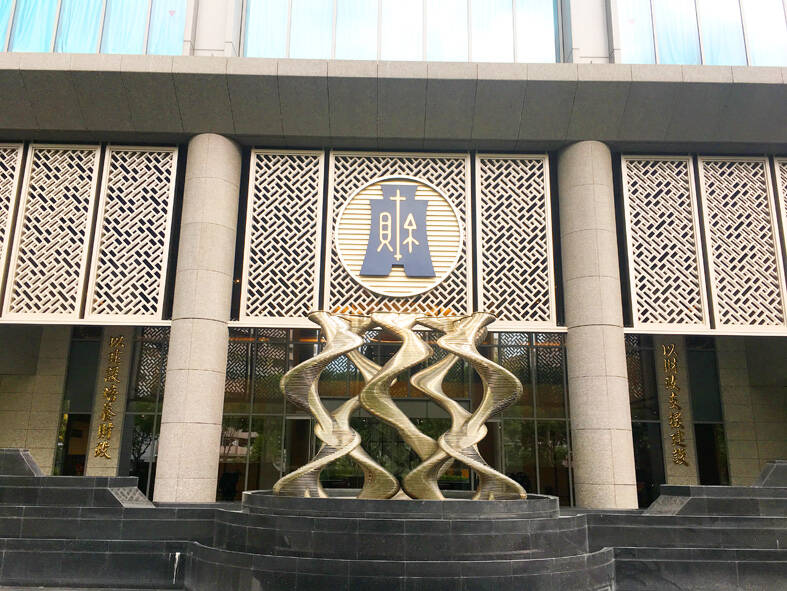The government, in collaboration with a public university, is aiming to develop 92 hectares of state lands in the eastern part of the country into carbon sinks, the Ministry of Finance said on Saturday.
The pilot project, part of the government’s goal to achieve net zero carbon emissions by 2050, is set to launch next year with the solicitation of bids for the establishment of carbon sinks in Yilan and Taitung counties, the ministry said.
A carbon sink is a natural or artificial reservoir that absorbs more carbon dioxide from the atmosphere than it releases. The world’s largest natural carbon sinks are the ocean, forests and soil, while artificial ones are developed by humans.

Photo: Clare Cheng, Taipei Times
The finance ministry’s National Property Administration (NPA), which manages most of Taiwan’s state lands, said it would be working with National Chung Hsin University (NCHU) in central Taiwan to develop 92 hectares of underused state land into carbon sinks, following years of research by the university in that field.
Under the pilot project, tenders would be put out for bids to grow forests on 20 hectares of state land in Yilan County’s Sansing Township (三星) and 72 hectares in Taitung County’s Chihshang Township (池上), an NPA official said.
The 20 hectares in Yilan were formerly a sand mining site, while the designated land in Taitung was once a rail yard, the official said, adding that neither of the sites is suitable for agriculture due to the soil quality.
The forest carbon sinks from which carbon credits are to be gained have to be artificially created rather than grown naturally, NCHU professor Liu Wan-yu (柳婉郁) said.
Furthermore, the cultivated forests cannot be located in areas where natural forests previously existed, which means natural forests cannot be cut down to grow new ones, if carbon credits are to be earned, she said.
The lands allocated by the NPA for use as carbon sinks comply with international regulations for earning carbon credits, Liu said.
When the pilot project is launched, it would be left up to the successful bidders to decide what kinds of trees should be planted, she said, adding that she would recommend species that have a high carbon and pollutant absorption capacity.
The successful bidders would rent the land from the NPA and would retain 90 percent of the carbon credits, while the other 10 percent would go to the government, the NPA said.
NCHU is to help oversee the project, monitor the forests’ absorption of carbon and involve its students in the work so that it can become a learning ground for them, Liu said.
She said that enterprises have started to see forests as a means of achieving their environmental, social and corporate governance goals and as an opportunity to earn carbon credits.
In earlier years, it would have been unthinkable for enterprises to bid to plant forests, as “no one would have wanted a piece of land just to grow trees,” Liu said, adding that the tenders for the carbon sink project are to be put out next year after the Lunar New Year holiday.
Building carbon sinks is one of the 12 key components of Taiwan’s carbon reduction plan, called Pathway to Net Zero Carbon Emissions in 2050, put forth by the National Development Council last year.

Taiwan has received more than US$70 million in royalties as of the end of last year from developing the F-16V jet as countries worldwide purchase or upgrade to this popular model, government and military officials said on Saturday. Taiwan funded the development of the F-16V jet and ended up the sole investor as other countries withdrew from the program. Now the F-16V is increasingly popular and countries must pay Taiwan a percentage in royalties when they purchase new F-16V aircraft or upgrade older F-16 models. The next five years are expected to be the peak for these royalties, with Taiwan potentially earning

STAY IN YOUR LANE: As the US and Israel attack Iran, the ministry has warned China not to overstep by including Taiwanese citizens in its evacuation orders The Ministry of Foreign Affairs (MOFA) yesterday rebuked a statement by China’s embassy in Israel that it would evacuate Taiwanese holders of Chinese travel documents from Israel amid the latter’s escalating conflict with Iran. Tensions have risen across the Middle East in the wake of US and Israeli airstrikes on Iran beginning Saturday. China subsequently issued an evacuation notice for its citizens. In a news release, the Chinese embassy in Israel said holders of “Taiwan compatriot permits (台胞證)” issued to Taiwanese nationals by Chinese authorities for travel to China — could register for evacuation to Egypt. In Taipei, the ministry yesterday said Taiwan

Taiwan is awaiting official notification from the US regarding the status of the Agreement on Reciprocal Trade (ART) after the US Supreme Court ruled US President Donald Trump's global tariffs unconstitutional. Speaking to reporters before a legislative hearing today, Premier Cho Jung-tai (卓榮泰) said that Taiwan's negotiation team remains focused on ensuring that the bilateral trade deal remains intact despite the legal challenge to Trump's tariff policy. "The US has pledged to notify its trade partners once the subsequent administrative and legal processes are finalized, and that certainly includes Taiwan," Cho said when asked about opposition parties’ doubts that the ART was

If China chose to invade Taiwan tomorrow, it would only have to sever three undersea fiber-optic cable clusters to cause a data blackout, Jason Hsu (許毓仁), a senior fellow at the Hudson Institute and former Chinese Nationalist Party (KMT) legislator, told a US security panel yesterday. In a Taiwan contingency, cable disruption would be one of the earliest preinvasion actions and the signal that escalation had begun, he said, adding that Taiwan’s current cable repair capabilities are insufficient. The US-China Economic and Security Review Commission (USCC) yesterday held a hearing on US-China Competition Under the Sea, with Hsu speaking on